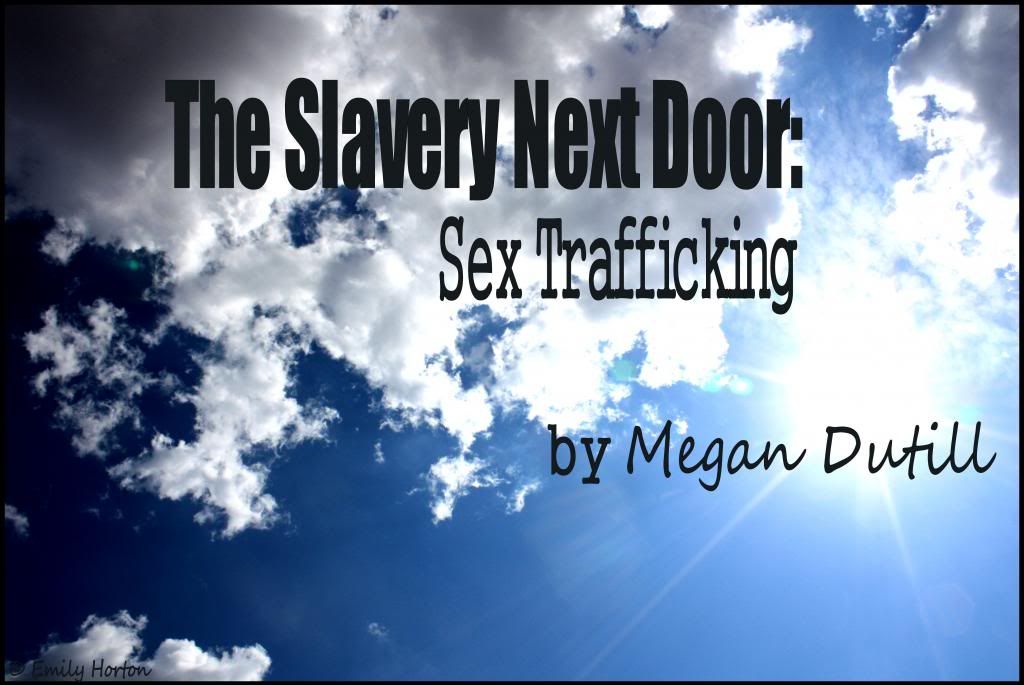The Slavery Next Door: Sex Trafficking

Today we're excited to share the following article by Megan - a continuation in our "Current Issues" series. We want to see current
issues, such as abortion or suicide, through a Biblical lens and not lean
on what the world says, but what God has to say about the particular
issue. We know that we have readers from various ages and backgrounds,
so we've kept that in mind and have made this section appropriate for
all. Perhaps you may not be dealing with the particular issue, but may
know someone who is. Keep your heart open to what the Lord wants to
teach you and pray for those who may struggle with the current issue.
“Human
trafficking” is one of today’s buzzwords. It’s a favorite cause of “social
justice” (another buzzword).
Most of us have
heard of this. And we may have even heard President Obama label it “modern-day
slavery.”
But what is it,
really? What does it mean for us?
The term “human
trafficking” basically means forcing someone to work against their will or in
unfair conditions: paying pennies in a factory, convincing them that they are
in incredible debt and therefore deserve to earn nothing for the rest of their
lives, selling their very bodies over and over, and more.
The latter is
specified as sex trafficking, which we’ll focus on in this article.
Unfortunately, it’s a booming industry in America. While it does consist of bringing
(often tricking) foreign women into the country and exploiting them, most
victims of sex trafficking are Americans. Estimates suggest that 100,000 –
300,000 children are trafficked in America each year, and the numbers could be
even higher, according to anti-trafficking organization Shared Hope International.
We also know
that most girls are trafficked between 12 and 14, and most adult sex workers
were trafficked into the industry as minors.
What does
trafficking entail? It usually involves psychological, emotional, and physical
manipulation of the highest degree. The trafficker (pimp) often targets a girl
who seems vulnerable – which includes circumstances like a poor or no family
structure and/or low self-esteem – and strikes up a relationship with her,
giving her attention and gifts and love. Sometimes she’ll willingly agree to
prostitute herself for him; other times she’ll be forced. Either way, the
victim has no idea of the brutal industry she’s getting into.
And those chords
of love and psychological manipulation, in addition to physical beatings,
punishments, and threats of hurting her family, create a powerful slavery that
is often very hard and dangerous for her to leave.
Sadly, there
is no area or type of person that is immune. Girls have been trafficked from
all locations, socioeconomic statuses, and family structures.
I’m not writing
that to scare you, but to explain how widespread this crime is and how much it
touches our very neighborhoods.
But where do we
go from here? As Christians, what should our response be?
It's a huge topic. But if we serve a God who personally came to earth to love us and set us free, slavery in any kind is something we must care about. And something that exploits young girls and the sacredness of sex is particularly evil.
What are some steps you can take today?
1) Continue
learning. Awareness is
one of the greatest tools for prevention. Being able to inform others, or even
spot the signs of a trafficking case, could save others from being trapped.
Check out Shared Hope International and The Polaris Project for more
information. And put the National Human Trafficking Hotline number in your cell phone, just in case: 1-888-373-7888.
2) Give
yourself. Your prayers,
your time, your money – all of them are crucial in changing the laws and the
culture in America and around the world. International Justice Mission has
volunteer positions and internships available, and both IJM and Shared Hope (as
well as many others) fund rescue missions in brothels and
aftercare/rehabilitation programs. In addition, this article offers a great
list of online boutiques that employ or directly help survivors.
4) Show grace. If you interact with people who have been in this situation, know that there were many painful factors outside of their control. Whether or not they made bad choices is not the point - but loving them like Christ is.
3) Keep
your eyes open. For
signs of trafficking, for friends in danger, and for other ways you can
creatively help. We’re not called to close our eyes and ignore brokenness, but
to be a catalyst of hope and healing.
And that’s just
the beginning of what is going on and how you can be involved. Do you have
other creative suggestions? What are some other hot topics you’re passionate
about?

Comments
Post a Comment